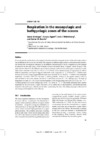Identificador persistente para citar o vincular este elemento:
https://accedacris.ulpgc.es/jspui/handle/10553/51651
| Título: | Respiration in the mesopelagic and bathypelagic zones of the oceans | Autores/as: | Arístegui, Javier Agustí, Susana Middelburg, Jack J. Duarte, Carlos M. |
Clasificación UNESCO: | 251001 Oceanografía biológica | Palabras clave: | Organic matter Dark ocean Ocean sediments Respiration rates Pelagic respiration, et al. |
Fecha de publicación: | 2005 | Publicación seriada: | Respiration in Aquatic Ecosystems | Resumen: | This chapter reviews the mechanisms of transport and remineralization of organic matter in the dark water-columns and sediments of the oceans. Different approaches to estimating respiration rates are compared, and the discrepancies obtained by different methodologies are discussed. Finally, a respiratory carbon budget is produced for dark ocean areas, which includes vertical and lateral fluxes of organic matter. Overall, direct measurements of respiration, as well as indirect approaches, converge to suggest a total dark ocean respiration of 1.5-1.7 Pmol C/a. Carbon mass balances in the dark ocean suggest that the dark ocean receives 1.5-1.6 Pmol C/a, similar to the estimated respiration, of which >70% is in the form of sinking particles. Almost all the organic matter (~92%) is remineralized in the water column, the burial in sediments accounts for less than 1%. Mesopelagic (150-1000 m) respiration accounts for ~70% of dark ocean respiration, with average integrated rates of 3-4 mol C/m2-a, 6-8 times greater than in the bathypelagic zone. The results show that respiration in dark ocean is a major component of the carbon flux in the biosphere. | URI: | https://accedacris.ulpgc.es/handle/10553/51651 | ISBN: | 9780191713347 | DOI: | 10.1093/acprof:oso/9780198527084.003.0010 | Fuente: | Respiration in Aquatic Ecosystems/ Paul A. del Giorgio and Peter J. le B. Williams,(eds), cap. 10 p. 181-205 |
| Colección: | Capítulo de libro |
Citas SCOPUSTM
4
actualizado el 08-jun-2025
Visitas
72
actualizado el 11-ene-2026
Descargas
134
actualizado el 11-ene-2026
Google ScholarTM
Verifica
Altmetric
Comparte
Exporta metadatos
Los elementos en ULPGC accedaCRIS están protegidos por derechos de autor con todos los derechos reservados, a menos que se indique lo contrario.
